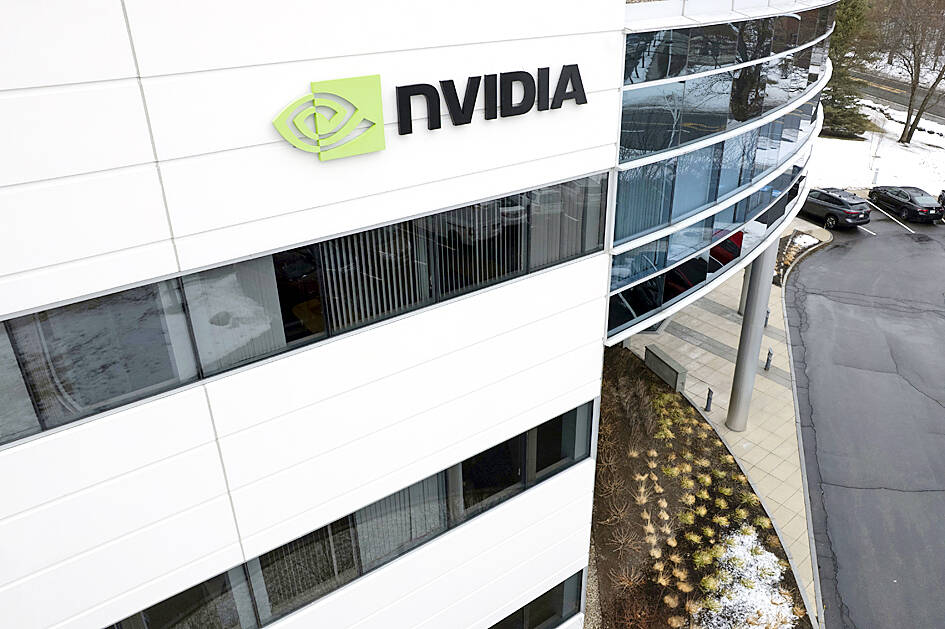Singapore charged three men with fraud in a case local media have linked to the movement of Nvidia’s advanced chips from the city-state to Chinese artificial intelligence (AI) firm DeepSeek (深度求索).
The US is investigating if DeepSeek, the Chinese company whose AI model’s performance rocked the tech world in January, has been using US chips that are not allowed to be shipped to China, Reuters reported earlier.
The Singapore case is part of a broader police investigation of 22 individuals and companies suspected of false representation, amid concerns that organized AI chip smuggling to China has been tracked out of nations such as Singapore.

Photo: EPA-EFE
Broadcaster Channel News Asia said it understood the cases were linked to the alleged movement of Nvidia chips from Singapore to be used by DeepSeek, without identifying its source.
Singapore’s government did not immediately respond to e-mail queries on whether the charges were linked to Nvidia and DeepSeek.
Charge sheets accused two Singaporeans, Aaron Woon Guo Jie, 41, and Alan Wei Zhaolun, 49, with criminal conspiracy to commit fraud on a supplier of servers last year.
They did this “by fraudulently making a false representation that the items would not be transferred to a person other than the authorized ultimate consignee of end users,” the court papers added.
The third person charged is Chinese national Li Ming, 51, accused of committing fraud on a supplier of servers in 2023 by saying Singapore-registered company Luxuriate Your Life Pte Ltd would be the end user of the items.
DeepSeek, Nvidia and Luxuriate Your Life did not immediately reply to requests for comment.
If found guilty of the offenses, the men could face penalties of a jail term of up to 20 years, a fine or both.
The police and charge documents did not elaborate on the items involved in the case, or identify the supplier of servers.
Police on Thursday said they had arrested nine people in a joint operation with customs authorities on Wednesday, raiding 22 locations from which they seized documentary and electronic records.
Singapore is Nvidia’s second-biggest market after the US, accounting for 18 percent of its total revenue in its latest fiscal year, a recent filing by the chipmaker shows. However, actual shipments to the Asian trading hub contributed less than 2 percent of total revenue, as customers use it as a center for invoicing sales to other countries.
Last week, Singapore’s minister of foreign affairs vowed to enforce multilateral export control regimes, saying the city state would not tolerate evasion, deception, false declarations or miscounting.

POWERING UP: PSUs for AI servers made up about 50% of Delta’s total server PSU revenue during the first three quarters of last year, the company said Power supply and electronic components maker Delta Electronics Inc (台達電) reported record-high revenue of NT$161.61 billion (US$5.11 billion) for last quarter and said it remains positive about this quarter. Last quarter’s figure was up 7.6 percent from the previous quarter and 41.51 percent higher than a year earlier, and largely in line with Yuanta Securities Investment Consulting Co’s (元大投顧) forecast of NT$160 billion. Delta’s annual revenue last year rose 31.76 percent year-on-year to NT$554.89 billion, also a record high for the company. Its strong performance reflected continued demand for high-performance power solutions and advanced liquid-cooling products used in artificial intelligence (AI) data centers,

SIZE MATTERS: TSMC started phasing out 8-inch wafer production last year, while Samsung is more aggressively retiring 8-inch capacity, TrendForce said Chipmakers are expected to raise prices of 8-inch wafers by up to 20 percent this year on concern over supply constraints as major contract chipmakers Taiwan Semiconductor Manufacturing Co (TSMC, 台積電) and Samsung Electronics Co gradually retire less advanced wafer capacity, TrendForce Corp (集邦科技) said yesterday. It is the first significant across-the-board price hike since a global semiconductor correction in 2023, the Taipei-based market researcher said in a report. Global 8-inch wafer capacity slid 0.3 percent year-on-year last year, although 8-inch wafer prices still hovered at relatively stable levels throughout the year, TrendForce said. The downward trend is expected to continue this year,

Vincent Wei led fellow Singaporean farmers around an empty Malaysian plot, laying out plans for a greenhouse and rows of leafy vegetables. What he pitched was not just space for crops, but a lifeline for growers struggling to make ends meet in a city-state with high prices and little vacant land. The future agriculture hub is part of a joint special economic zone launched last year by the two neighbors, expected to cost US$123 million and produce 10,000 tonnes of fresh produce annually. It is attracting Singaporean farmers with promises of cheaper land, labor and energy just over the border.

US actor Matthew McConaughey has filed recordings of his image and voice with US patent authorities to protect them from unauthorized usage by artificial intelligence (AI) platforms, a representative said earlier this week. Several video clips and audio recordings were registered by the commercial arm of the Just Keep Livin’ Foundation, a non-profit created by the Oscar-winning actor and his wife, Camila, according to the US Patent and Trademark Office database. Many artists are increasingly concerned about the uncontrolled use of their image via generative AI since the rollout of ChatGPT and other AI-powered tools. Several US states have adopted